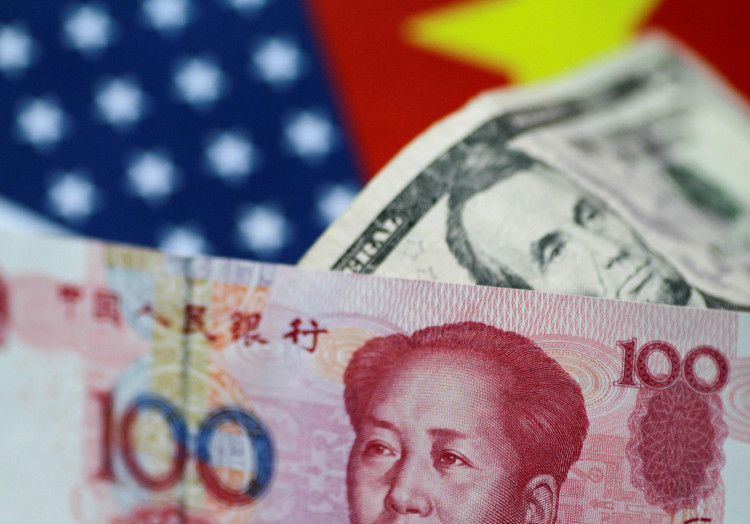Summary: Wang Youxin, senior researcher at the Bank of China Research Institute, believes that while risk aversion may temporarily strengthen the dollar, it currently shows signs of being overvalued. Once risk aversion subsides, the dollar will once again trend downwards. The recovery of China's economy will provide more support for the Renminbi, and it is expected to continue to exhibit two-way fluctuations and a trend of stability within the year.
On May 17, both the onshore and offshore Renminbi broke the "7" barrier against the US dollar for the first time since Dec. 7 and Dec. 29 of last year, respectively. As of 4:30 p.m. on May 17, the onshore Renminbi had hit a low of 7.0049 against the US dollar and closed at 6.9985, falling 344 basis points from the previous trading day. The offshore Renminbi was quoted at 7.0155 against the US dollar.
Recently, the Renminbi has been fluctuating against the US dollar. In an analysis provided to Securities Daily, Wang Qing, chief macro analyst at Dongfang Jincheng, stated that the Fed's May meeting suggested a low likelihood of interest rate cuts within the year, which has led to a rebound in the dollar index. As a result, the Renminbi has depreciated against the dollar. Since the beginning of the year, domestic settlement rates have generally been low and selling rates have been high. This means that large trade surpluses are more likely to be converted into domestic dollar deposits rather than exchanged for Renminbi, which can impact the balance of supply and demand in the foreign exchange market, leading to the depreciation of the Renminbi against the dollar.
Data from Wind shows that the dollar index has risen by over 1.2% since May, and even reached 103.0396 during trading on May 17, hitting a new high since April 4.
"Looking at the external environment, the Fed's slowing interest rate hike has somewhat alleviated the external constraints facing our economy. Internally, the domestic economy is recovering steadily. Despite the global trade slowdown, our country has maintained good trade performance, and cross-border capital continues to flow in," Wang Youxin told a reporter from Securities Daily. In this context, neither the economic fundamentals nor the monetary policy cycle support a continued adjustment of the Renminbi exchange rate. Therefore, the recent fluctuations in the exchange rate are more influenced by risk aversion.
Wang Youxin analyzed that although the US faces economic downturn and unresolved debt issues, the dollar has risen instead of fallen due to risk aversion, causing short-term disturbances to the Renminbi exchange rate. The adjustment of the Renminbi exchange rate is more of a short-term phenomenon.
"The risk aversion may drive the dollar stronger in the short term, but the dollar is currently showing signs of being overvalued. Once risk aversion fades, the dollar will turn downwards again. The recovery of China's economy will provide more support for the Renminbi, and it is expected that the Renminbi will continue to exhibit two-way fluctuations and a trend of stability within the year," said Wang Youxin.
In recent years, the Renminbi exchange rate has broken "7" several times. Yi Gang, Governor of the People's Bank of China, said at the "2023 China Financial Society Academic Annual Meeting and China Financial Forum Annual Meeting" in April that in the past five years, the Renminbi has broken "7" against the US dollar three times. The first time was in August 2019, the second in February 2020, and the third in September last year. Each time, it took about five months to get back below 7, and three months last year. This is a result of market supply and demand, showing that China's foreign exchange market has resilience and can achieve dynamic equilibrium.
"In the past five years, the Renminbi has broken '7' against the US dollar three times and returned to below '7', significantly increasing its elasticity," Wang Qing believes. The slowing pace of the Fed's interest rate hikes, coupled with the impact of the banking crisis, is further increasing downward pressure on the US economy. The probability of a continued rise in the dollar index later on is not high. With the overseas economy declining this year and the domestic economy continuing to recover, there is no significant room for depreciation of the Renminbi.






